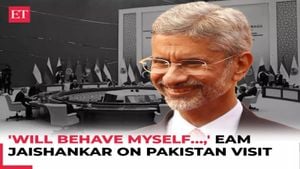Indonesia is stepping onto the world stage with fresh determination under the leadership of President Prabowo Subianto. With his inauguration marking the start of what many believe to be a significant shift in the nation’s foreign policy orientation, the topic of Indonesia's potential membership within major global coalitions is buzzing throughout diplomatic circles. Prabowo’s recent announcements and ministerial appointments indicate a turn toward securing alliances, particularly with groups such as BRICS, which symbolizes the interest of developing nations advocating for greater representation and influence.
This geopolitical pivot is underscored by the newly appointed Foreign Minister, Sugiono, who has taken the reins from veteran diplomat Retno Marsudi. His position marks a departure from Indonesia's more measured foreign policy approach, aiming to embrace the BRICS bloc fully. The sooner membership is pursued indicates Indonesia’s readiness to embrace broader ambitions beyond its previous cautious stance.
Bringing a military-affiliated figure like Sugiono, who served as first lieutenant with Kopassus, the army's special forces, seems to reinforce the military’s renewed influence within the governmental framework. Historical parallels have been drawn to the Suharto era, which saw the military wield significant control over both governance and foreign relations. Under the so-called ‘double function’ doctrine, the military held sway over political and societal matters, creating concerns about democratic regressions.
The call for Indonesia’s full BRICS engagement also hints at intentions to assert its influence as both a regional leader and as part of the global South’s dialogue. Herein lies Sugiono’s rationale, which suggests Indonesia could leverage its status to champion development rights for nations sharing common interests.
This approach should also resonate with domestic priorities. Sugiono has publicly stated the relevance of BRICS to Indonesia’s own goals—namely, issues like food security, energy independence, and poverty alleviation. By engaging with this new coalition, Indonesia could advance local agendas and produce substantial benefits both internally and externally.
Interestingly, there are lessons to glean, especially considering Indonesia's earlier reservations about aligning too closely with BRICS—something the previous administration had approached with caution. Now, the eagerness of Prabowo’s government to push these boundaries raises questions about the potential repercussions when it interacts with superpowers such as the U.S. and China.
Economically, this dual pursuit of membership raises questions. Current economic discussions suggest Indonesia should maintain relationships with both BRICS and the OECD for the best possible economic outcomes. While BRICS is seen as more accessible, membership with OECD remains desirable for its stability and established economic models. The challenge lies not only with the membership bids but also with how Indonesia balances its expectations and obligations to these groups.
Foreign affairs observers caution against leaping too quickly. Comprehensive discussions on the merits and demerits of joining BRICS must include how such associations influence economic stability and regional coordination. Economists suggest maintaining relationships with both blocs could yield maximum strategic leverage.
Yet, there’s recognition of the broader regional dynamics at play. Indonesia's historical relationship with ASEAN underlines its foundational belief in multilateralism—a principle expected to remain integral to its approach. The recent embrace of BRICS could also impact efforts to forge stronger connections within ASEAN, which may be viewed as counter-intuitive to the organization’s collaborative essence.
While Prabowo’s government conveys confidence, experts urge careful navigation between power blocs. The task involves balancing Indonesia’s burgeoning relationships without appearing overly dependent or aggressive. This emphasis on diplomatic tact will be fundamental, especially as the nation defines its position within the larger fabric of international relations.
Critically, the move toward BRICS membership harkens back to Indonesia’s legacy as the founding member of the Non-Aligned Movement. A slightly different interpretation emerges under Prabowo, where non-alignment may now adapt to facilitate engagement with major powers, which could, paradoxically, put the country back onto the tightrope of geopolitical commitments.
With Prabowo eager to play more than just the gatekeeper of Indonesia’s domestic affairs, observers look to how his policies will play out. Engaging China through military exercises and rekindling relations with Russia suggests Indonesia is ready to embrace the more assertive stance. This shift might signal Jakarta's intention to forge pathways in previously uncharted territories, reflecting both aspirations and caution.
Concurrently, the potential ramifications of these strategic decisions are being closely monitored. Is Indonesia backtracking on its commitment to uphold democracy and civil liberties? The builds toward more militaristic governance bring concerns for many, but supporters argue this reflection on national security needs could benefit Indonesia as it grapples with territorial concerns and regional stability.
Moving forward, it remains to be seen how successful Indonesia will be as it attempts to engage deeply with BRICS amid changing international norms. Prabowo's assertive foreign policy approach may yield unexpected alliances and challenges, pushing the nation forward but also necessitating vigilance over the democratic values it aims to uphold.
For many Indonesians, the question becomes whether this renewed military influence will serve the country’s best interests or whether it reflects stepping back toward historical precedents. Therein lies the tension—the anticipation of greater global engagement alongside the need to guard Indonesia's democratic institutions and social fabric.
Only time will tell if these ambitious moves will solidify Indonesia’s status as a global player, reinforcing its priorities on the world stage and securing trust among its citizens without compromising its democratic essence and social cohesion.



